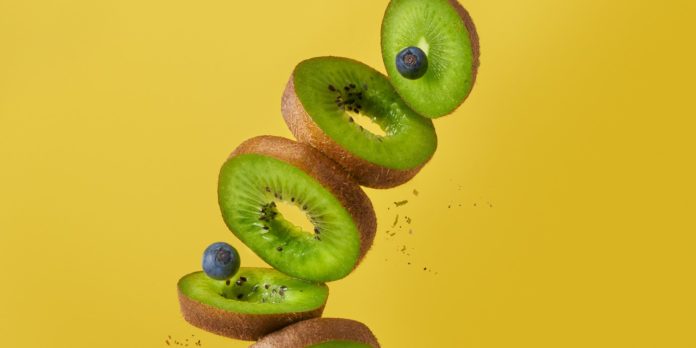How Healthy Is Kiwi Fruit?
In terms of beauty and nutritional value, the kiwi is a one-of-a-kind fruit. The vibrant green slices flecked with tiny black seeds have long added a pop of color to desserts and fruit platters. It has a nice appearance and flavor, making it a popular fruit choice. It is thought to be Chinese in origin and has long been prized for its therapeutic benefits. Ironically, it became regarded as the national fruit of New Zealand and was reintroduced to the globe as ‘kiwi’ rather than its previous names, yang tao, and Chinese gooseberry over time.
There are speculations that kiwi arrived in New Zealand via missionaries, and it became so popular there that it was professionally grown and marketed as ‘kiwi’. Europeans and Americans alike took advantage of its popularity, incorporating it into their cereals, sweets, and other foods. There are numerous kiwi benefits, and including them in your daily diet helps your health in a variety of ways. Kiwi is an exotic fruit that is frequently used as a topping for pavlovas, fruit bowls, salads, and smoothies. It is rarely cooked; in desserts, in particular, it is used fresh since an enzyme found in it tends to break down milk proteins quickly, interfering with the dish’s final texture.
It is often used in the preparation of roasts and curries as a tenderizing agent for meats. However, it is stated that the greatest method to get the most nutritional benefit from it is to eat it raw, on its own. Kiwifruit includes 61 calories per 100 grams, 14.66 grams of carbohydrates, 1.14 grams of protein, 0.52 grams of fat, and 3 grams of fiber. Kiwi is juicy and refreshing with a sweet and tart flavor, with fuzzy brown skin and shimmering, bright green flesh, and should be included in your diet to reap the amazing benefits.
10 Health Benefits of the Kiwi Fruit
While we think of apples as the miracle fruit, kiwis are also high in critical vitamins and minerals and can help you stay healthy in a variety of ways. The following are some of the advantages of kiwi fruit:
Abundant in Vitamin C
If you believed lemons and oranges were the best providers of vitamin C, you’re wrong! According to the nutritional breakdown of kiwi fruit, it contains 154 percent vitamin C per 100 grams, which is about twice as much as lemons and oranges. Vitamin C is an antioxidant that fights inflammation and cancer-causing free radicals. It also aids in the body’s immune system’s defense against dangerous infections.
Induces Sleep
 Do you have difficulties sleeping? Numerous researches have revealed that kiwi fruit contains a variety of medicinally valuable chemicals, including antioxidants and serotonin, which may help with sleep difficulties. It’s been suggested that eating two kiwi fruits an hour before bedtime can greatly aid in inducing sleep.
Do you have difficulties sleeping? Numerous researches have revealed that kiwi fruit contains a variety of medicinally valuable chemicals, including antioxidants and serotonin, which may help with sleep difficulties. It’s been suggested that eating two kiwi fruits an hour before bedtime can greatly aid in inducing sleep.
Treats Asthma
Vitamin C levels in kiwis have been associated with a decrease in wheezing symptoms in some asthma patients. This is particularly true for children who appear to benefit the most from eating kiwis.
Aids Digestion
The enzyme actinidain, which is related to papain in papaya, is found in kiwifruit and is popular for its ability to dissolve proteins. It’s for this reason that it’s commonly used to tenderize meat. It also helps the body digest proteins and has been demonstrated to help patients with irritable bowel syndrome.
Vitamin and Mineral Powerhouse
The kiwi fruit is high in vitamins A, B6, B12, E, potassium, calcium, iron, and magnesium. These all help the body work properly, ensuring blood circulation through the vessels, stress management, iron absorption for strong bones and teeth, good vision, among other benefits. The high potassium content (312 mg per 100 grams) aids in blood pressure control, while magnesium aids nerve and muscle function.
Rich Source of Dietary Fiber
This exotic fruit is high in dietary fiber, which aids in the prevention of a variety of ailments. Eating more fiber-rich foods can help to reduce the risk of cardiovascular disease (CVD) and coronary heart disease (CHD). High fiber diets keep you fuller for longer and help to regulate metabolic parameters such as blood pressure, cholesterol, and blood sugar. It also aids weight loss and is frequently prescribed to diabetics.
Promotes a Healthy Skin
Kiwi is alkaline in nature, which means it helps to balance out the acidic foods we eat on a regular basis. A healthy body has a good pH balance, which helps you stay active, full of energy, and with younger-looking skin. Vitamins C and E found in kiwis are good for the skin because they work as antioxidants, preventing skin deterioration. For best effects, cut a few slices and apply them to your skin.
Rich Folate Source
The Chinese placed a high value on kiwi because of its medicinal capabilities. It has a lot of folate, which is helpful for pregnant women because it aids in the development of the fetus and keeps it healthy. It is also beneficial to infants.
Prevents Vision Loss
 You can prevent macular degeneration and, ultimately, vision loss by eating kiwis. Zeaxanthin and lutein (often known as the “eye vitamin”) are found in kiwifruit. These two chemicals act as antioxidants and aid in the formation of vitamin A, an important component for your eyes. They also safeguard the eye from cataracts and other eye-related disorders by absorbing excess light that could harm our retinas.
You can prevent macular degeneration and, ultimately, vision loss by eating kiwis. Zeaxanthin and lutein (often known as the “eye vitamin”) are found in kiwifruit. These two chemicals act as antioxidants and aid in the formation of vitamin A, an important component for your eyes. They also safeguard the eye from cataracts and other eye-related disorders by absorbing excess light that could harm our retinas.
A healthy neural system can benefit your retina, which contains the highest concentration of nerves and serves as the eye’s primary communication hub.
Kiwis are also high in copper, a vital component that helps to maintain the neurological system and, as a result, the healthy functioning of the eyes.
Reduces DNA Damage
When free radicals and antioxidants in your body are out of balance, it causes oxidative stress. DNA strand breakage may occur as a result of this process. This can result in a variety of health issues, some of which are difficult to detect or cure. Antioxidants in the kiwi fruit can help to prevent oxidative stress. A study that used peroxide to damage people’s cells found that individuals who took kiwi supplements had better DNA repair abilities after the peroxide was applied. This suggests that kiwi may aid in the prevention of long-term malignancies and lifestyle disorders like colon cancer, which is connected to DNA damage.
Side Effects of Kiwi
Kiwis are a delicious fruit, but many individuals are allergic to them. The severity of the symptoms might range from minor to severe. Mild symptoms could include:
- You may experience itching or pain on your tongue, lips, or mouth.
- A visible rash on the skin.
If you have any of the following severe symptoms, consult your doctor immediately.
- Breathing problems or other asthma symptoms
- Throat, lip, or mouth swelling
- Pain in the abdomen
- Dizziness
- Vomiting
Now that you Know…
Kiwis are high in vitamins, minerals, enzymes, antioxidants, and fiber, as well as being great in fruit salads, smoothies, and as a snack. All of these nutrients are necessary for our bodies to function properly and to stay healthy. When compared to an orange, kiwis have a far higher vitamin C content. Kiwis are therefore beneficial for immunological support, blood pressure regulation, and even disorders like asthma and macular degeneration. Kiwi also contains bromelain, a special enzyme that aids digestion and helps the body fight inflammation. Because kiwifruit is low in calories, high in fiber, and includes protein-digesting enzymes and vitamin C, it can help you lose weight. If you want to boost your cardiovascular and digestive health, eating one or two kiwis is a terrific suggestion. Incorporate kiwis into your diet on a daily basis as a smoothie or a light snack and see how it benefits you.




